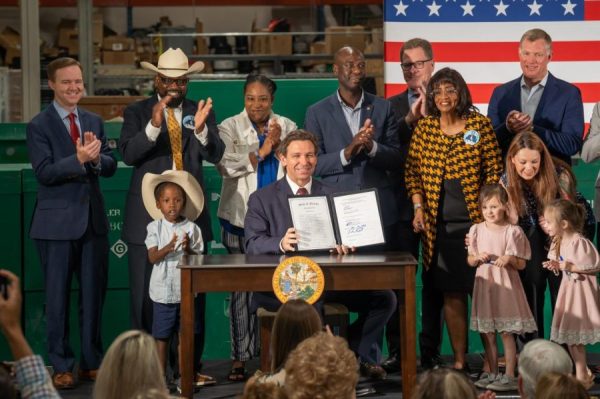
Racing to compete with other border states such as Texas, Florida Governor Ron DeSantis’ administration looks to take the lead in conservative immigration laws. In a bid to make Florida a model for anti-illegal immigration legislation and to draw support for his presidential run, the Florida governor has ramped up legislative efforts in his bid to stop illegal aliens looking to make the state home. His magnum opus thus far? Senate Bill 1718.
The bill, which went into effect on July 1 of this year, featured several angles of attacking the issue of illegal immigration. Under this law, anyone who knowingly brings an immigrant who has not been “inspected” by authorities into Florida is at risk of a felony-level human smuggling charge. According to the Florida Department of Motor Vehicles, only three arrests have been made due to this new crime.
Private businesses with 25 or more employees are now obligated to use E-Verify, an online federal service that certifies employee eligibility to work in the state. Controversially, the bill also limits social services provided for immigrants, requires Medicaid-funded hospitals to ask for immigration status, invalidates out-of-state driver’s licenses used by illegal immigrants, and more.
“The Biden Border Crisis has wreaked havoc across the United States and has put Americans in danger,” said DeSantis. “In Florida, we will not stand idly by while the federal government abandons its lawful duties to protect our country. The legislation I signed today gives Florida the most ambitious anti-illegal immigration laws in the country, fighting back against reckless federal government policies and ensuring the Florida taxpayers are not footing the bill for illegal immigration.”
Joining in on criticism of the Biden administration’s approach towards undocumented immigrants, Senator Blaise Ingoglia condemned the “manmade crisis under the ineptness of President Biden, allowing more than 6.3 million illegal immigrants to flood our border.” Representative Kiyan Michael affirmed, “Florida sent a strong message that as a state, we will protect our resources, our communities, and our families.”
But not everyone is happy. Some argue that SB 1718’s expansion of several anti-terrorism laws to include illegal immigration – without a matching appropriation to fund the massive increase in responsibility – will “dilute” the resources of the Florida Department of Law Enforcement and other law enforcement agencies in the state. Others criticize the $12 million appropriation given from the taxpayer-funded General Revenue Fund to the governor’s “Unauthorized Aliens Transport Program,” which became the subject of much debate after flying about 50 Venezuelan migrants on two charter planes from Texas to Martha’s Vineyard in Massachusetts last September.
Several legal organizations, including the Southern Poverty Law Center, American Civil Liberties Union, ACLU of Florida, Americans for Immigrant Justice, and American Immigration Council, have filed a lawsuit against the bill, calling Section 10 (which criminalizes the smuggling of undocumented migrants into Florida) “draconian” and “vague” due to a failure to define or clarify what an “inspection” of migrants who may have entered the state unlawfully is.
According to the American Community Survey taken by the Census Bureau, 8% of Florida’s residents are noncitizen immigrants, making up 11% of the state’s nonelderly workforce. In some industries, such as Agriculture and Construction, those figures shoot up to 37% and 23% respectively.
Reports of business owners losing workers to other states, desolate construction sites, and striking truck drivers stoked *** fears of losing the state’s significant population of workers without papers. More recently, Hurricane Idalia disaster relief efforts were hindered thanks to laborer fears of an increased risk of deportation after the bill’s passage, dealing a critical blow to recovery work after some of Florida’s most impoverished communities were demolished in the wake of Idalia’s wrath along the Gulf Coast.
In recent months, there have been reports of immigrants avoiding hospitals entirely to avoid misinformed fears of mandatory immigration status questions.
On November 27, Florida’s Grand Jury released a 146 page report analyzing the state of immigration in Florida and the nation at large, criticizing the Biden administration’s handling of the immigration crisis that has polarized the nation and is threatening “physical and financial dangers” to Floridians.
Efforts were made to contact DeSantis’ press office and multiple non-profit organizations specializing in immigration via email for comment, but no response was given.